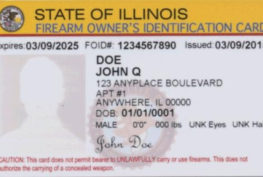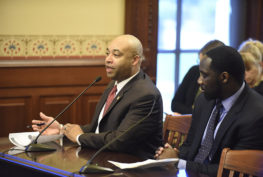SPRINGFIELD, Ill – Throughout the 2019 Legislative Session, state Rep. Justin Slaughter, D-Chicago, advocated for middle-class families by supporting a Fair Tax, protected access to health care, backed commonsense gun safety legislation and fought for criminal justice reforms.
Slaughter voted in favor of the Fair Tax amendment, which would cut taxes for 99 percent of local families and require the ultra-wealthy to pay their fair share. Middle-class families would also receive additional tax credits for each child to help ease the costs of living.
“With a Fair Tax, Illinois will move away from a tax structure that benefits the wealthy and places an unfair burden on working families,” Slaughter said. “Implementing a fairer tax system that requires millionaires and billionaires to pay their fair share will help provide needed relief to middle-class families while ensuring that critical services such as health care, education, and senior services are funded.”
In addition to voting for the Fair Tax amendment, Slaughter backed measures to protect health care coverage for those with pre-existing conditions and help keep health care costs from increasing. Slaughter sponsored Senate Bill 2026 to keep Illinois from reducing or eliminating coverage for pre-existing conditions required under the Affordable Care Act and supported House Bill 471 to prevent excessive health insurance rate hikes.
Slaughter, a strong advocate for women’s rights, also supported the Reproductive Health Act to protect a woman’s right to reproductive health care from the political crossfire of extreme, anti-woman politicians in Washington.
“Health care should be a right for every resident of Illinois, and we must do all we can to protect and expand access to the health care services we need,” Slaughter said. “The wellbeing of our community is one of my top priorities, and we must continue to work to implement measures that protect their health and safety.”
Slaughter further protected the wellbeing of residents by backing commonsense gun safety legislation that would close loopholes in the Firearm Owner Identification (FOID) system and keep dangerous firearms out of the wrong hands. He supported Senate Bill 1966, also known as the Fix the FOID Act that would ensure that violent criminals cannot legally obtain guns and help streamline the revocation process for law enforcement.
As the Chairman of the House Judiciary-Criminal Committee, Slaughter also took steps to pass numerous criminal justice reform measures, including House Bill 1438, which legalizes recreational marijuana for adult use and offers expungement of records for persons arrested for possession charges. Slaughter also sponsored and passed House Bill 386 to require transparency from the Department of Corrections on assessments used for conditions of release as well as the use of electronic and GPS monitoring. In addition, Slaughter introduced House Bill 3061, which helps provide opportunities for those with non-violent criminal records to more easily apply for health care worker license. Slaughter also introduced House Bill 3349 to improve outdated water and sewer infrastructure while providing jobs to underserviced communities, and House Bill 2304 which establishes a youth oriented trades and skills program to help prepare young people from disadvantaged communities to earn valuable and rewarding skills.
“It is critical that we expand access to new jobs for those who are working toward a better future and create job training programs for underserved communities,” Slaughter said. “Legalizing cannabis and allowing for the expungement of nonviolent offenses will help people pursue opportunities and contribute to making Illinois a better, more prosperous state.
“My commitment to our community means taking steps to fix our criminal justice system, creating economic opportunity, protecting and expanding access to health care and providing needed tax relief to middle-class families. There is more work to be done, and I will continue fighting for the needs of our community while working to build a stronger Illinois by building a stronger middle class.”





